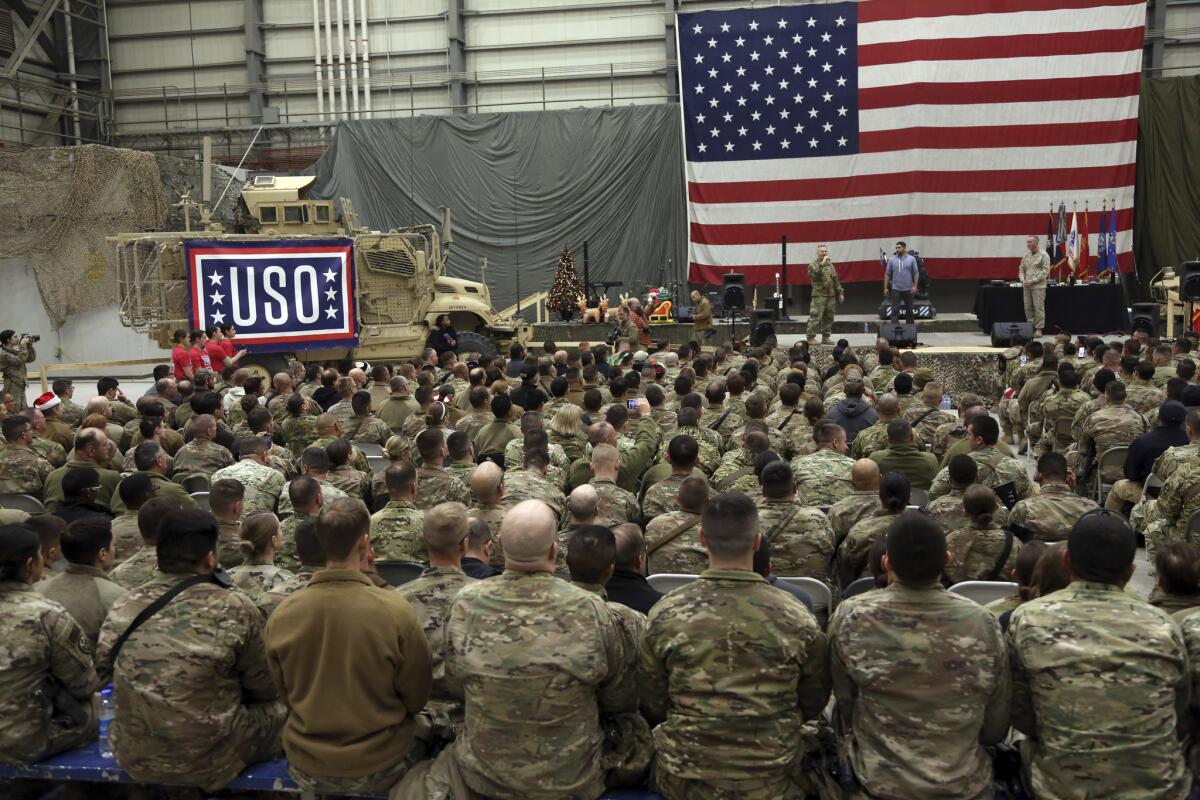Trump cuts troop levels to 2,500 in Iraq and Afghanistan

WASHINGTON — At President Trump’s direction, the Pentagon on Tuesday ordered U.S. troop levels reduced to 2,500 in both Iraq and Afghanistan, accelerating a planned drawdown but stopping short of the departing president’s promise to end America’s involvement in the two lengthy conflicts.
Acting Defense Secretary Christopher Miller, who last week took over from his fired predecessor and arrived with instructions from Trump to expedite the pullout, said the drawdown to a small residual force in each country would be achieved by Jan. 15. That is five days before President-elect Joe Biden is to be sworn in as Trump’s successor.
“I am formally announcing that we will implement President Trump’s orders to continue our repositioning of forces from these two countries,” Miller told reporters at a Pentagon news conference. “This is consistent with our established plans and strategic objectives.”
Trump reconsidered a complete troop pullout after pushback in recent days from top commanders and from Republicans in Congress, who said they feared an abrupt exit after two decades of war could embolden the remnants of the Islamic State in Iraq and undercut fragile peace talks between the Afghan government and the Taliban.
Major military moves by a lame-duck president are unusual, but Trump has refused so far to concede the election and may be seeking to salvage his legacy — and prepare for a 2024 re-run — by further disengaging from the Middle East. That is a course popular with many Americans weary of open-ended wars that have cost the lives of more than 6,900 service members since 2001.
The president had only mixed success during his term at putting in place a national security team that would back his aim of sharp cuts in military forces in the Middle East. He initially increased troops in Afghanistan from 8,600 to roughly 14,000 on the advice of military advisers in 2017.
Troop levels have come down sharply since then. Still, Trump often found his orders slow-rolled by Pentagon brass or even reversed as he sought to exit not only from Iraq and Afghanistan but also from Syria and Somalia.
With his election loss, a defiant Trump fired Defense Secretary Mark Esper, who had resisted some of his calls for troop withdrawals, and replaced him last week with Miller, a retired Army Special Forces officer who quickly signaled his willingness to back the president’s priorities.
On Friday, days after taking office, Miller announced in a letter to Pentagon personnel that it was “time to come home” from foreign conflicts. He followed up that missive with another public statement yesterday, saying his goal was to “bring the current war to an end.”
The cuts that Miller announced in a prepared statement, without taking questions from reporters, would lower the number of troops in Afghanistan from more than 4,500 to 2,500 and in Iraq from about 3,000 to 2,500.
The remaining American troops — a tiny fraction of the more than 177,000 military personnel in Iraq and the more than 100,000 in Afghanistan at the height of the two wars — will provide security to a handful of remaining U.S. bases and to diplomatic facilities, said Robert O’Brien, Trump’s national security advisor.
“By May, it is President Trump’s hope that they will come home safely and in their entirety,” O’Brien said in a brief statement to reporters at the White House.
Young Afghans fear losing new freedoms and their lives to the Taliban as U.S. troops prepare to exit.
That decision, however, will rest with Biden, who was an advocate for reducing the U.S. military footprint as vice president to President Obama. But like Trump and Obama, he may hesitate to carry out a complete pullout, preferring to keep a small military presence in both countries rather than risk seeing them erupt in new violence.
“Make no mistake: President Trump is salting the earth on his way out,” said Sen. Dianne Feinstein (D-Calif.). “Having lost the election, he’s now trying to tie President-elect Biden’s hands on foreign policy.”
As Miller was announcing the troop decision at the Pentagon, Biden was holding a virtual meeting from Wilmington, Del., with a group of national security advisors, including several who played key roles in both the Iraq and Afghanistan wars.
“I just wanted to get your input on what you see ahead,” Biden told the group, noting that Trump was not providing him with regular classified national security briefings, a normal post-election courtesy for incoming presidents. “To state the obvious, there’s no presidential responsibility more important than protecting the American people.”
Among those who met with Biden were retired Army General Stanley McChrystal, a former top commander in Iraq and Afghanistan; retired Navy Adm. Will McRaven, who commanded the operation that killed Osama Bin Laden in Pakistan; and Army Gen. Lloyd Austin, a former top commander in Iraq.
Pentagon officials have noted that the Taliban have stepped up attacks on Afghan forces, even as the U.S. force there has halted almost all attacks against the insurgents, as required by an agreement between the Trump administration and the militants signed last February.
That agreement calls for the U.S. to withdraw completely from Afghanistan by next May, but U.S. commanders have insisted that their exit is contingent on improvements in security conditions and on the Taliban’s willingness to pursue a peace deal. Neither condition has been met.
Even the modest troop cuts announced by the Pentagon were criticized by members of Congress, including some Republicans.
“I believe that these additional reductions of American troops from terrorist areas are a mistake,” said Rep. Mac Thornberry (R-Texas) the top Republican on the House Armed Services Committee, who is retiring this year. “Further reductions in Afghanistan will also undercut negotiations there; the Taliban has done nothing — met no condition — that would justify this cut.”
The drawdown has also received a skeptical response from NATO allies, who have thousands of troops in Afghanistan and have privately criticized Trump for announcing U.S. reductions without consulting them.
“The price for leaving too soon or in an uncoordinated way could be very high,” NATO Secretary General Jens Stoltenberg told CNN in a statement Tuesday. “Afghanistan risks becoming once again a platform for international terrorists to plan and organize attacks on our homelands. And ISIS could rebuild in Afghanistan the terror caliphate it lost in Syria and Iraq.”
It was in the mountainous wilds of Afghanistan that Bin Laden plotted the terrorist attacks of Sept. 11, 2001, which gave rise to the 19-year-old war in that country.
Sen. Jack Reed (D-R.I.), the top Democrat on the Senate Armed Services Committee and a retired Army officer, said Trump was “venting his frustration over losing the election in a manner that is more costly, jeopardizes our military personnel” and “aids the Taliban and terrorist networks.”
Other Democrats who have long called for reorienting the U.S. military campaign in the Middle East backed Trump’s move.
Rep. Adam Smith (D-Wash.), chairman of the House Armed Services Committee, said in a statement, “After speaking with the Acting Secretary this morning, I believe reducing our forward deployed footprint in Afghanistan down to 2,500 troops is the right policy decision.”
More to Read
Sign up for Essential California
The most important California stories and recommendations in your inbox every morning.
You may occasionally receive promotional content from the Los Angeles Times.












